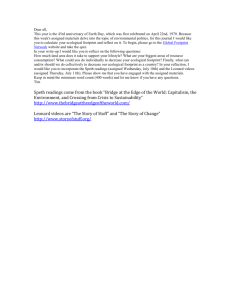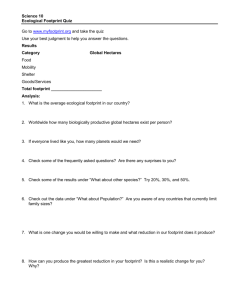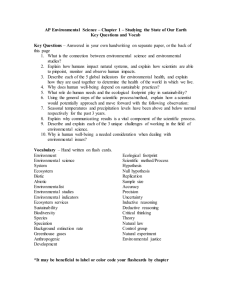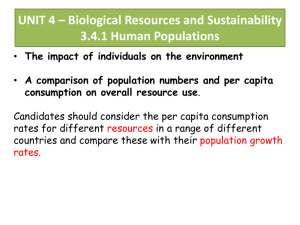Ecological-Footprint-Lab-Write-Up
advertisement
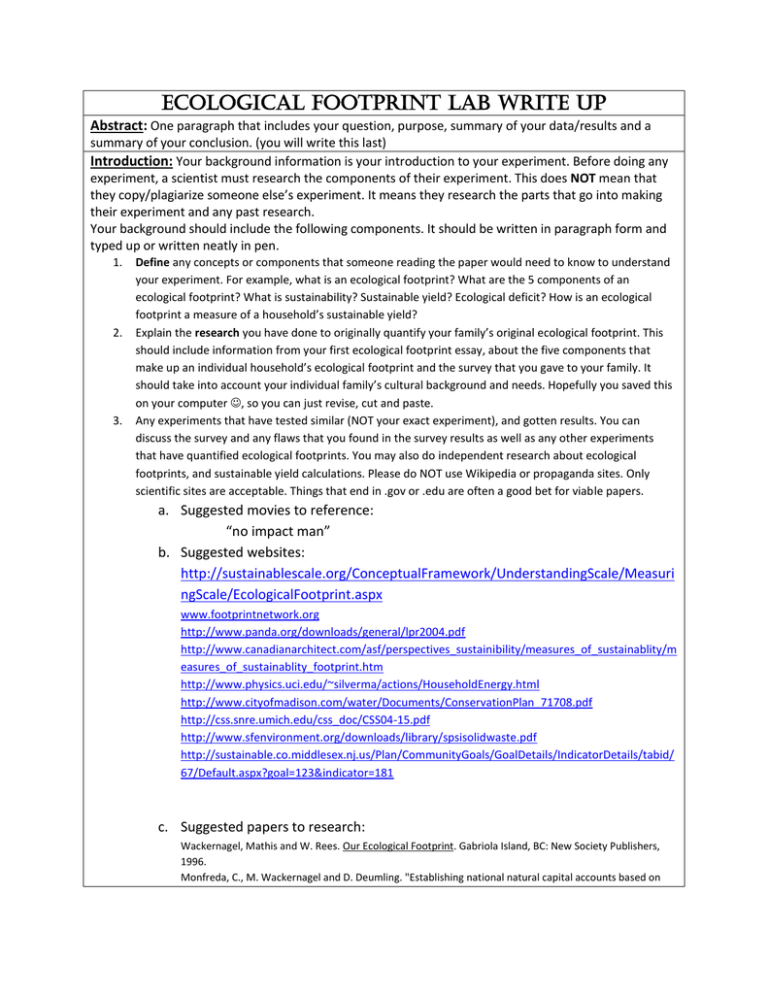
Ecological Footprint Lab Write Up Abstract: One paragraph that includes your question, purpose, summary of your data/results and a summary of your conclusion. (you will write this last) Introduction: Your background information is your introduction to your experiment. Before doing any experiment, a scientist must research the components of their experiment. This does NOT mean that they copy/plagiarize someone else’s experiment. It means they research the parts that go into making their experiment and any past research. Your background should include the following components. It should be written in paragraph form and typed up or written neatly in pen. 1. 2. 3. Define any concepts or components that someone reading the paper would need to know to understand your experiment. For example, what is an ecological footprint? What are the 5 components of an ecological footprint? What is sustainability? Sustainable yield? Ecological deficit? How is an ecological footprint a measure of a household’s sustainable yield? Explain the research you have done to originally quantify your family’s original ecological footprint. This should include information from your first ecological footprint essay, about the five components that make up an individual household’s ecological footprint and the survey that you gave to your family. It should take into account your individual family’s cultural background and needs. Hopefully you saved this on your computer , so you can just revise, cut and paste. Any experiments that have tested similar (NOT your exact experiment), and gotten results. You can discuss the survey and any flaws that you found in the survey results as well as any other experiments that have quantified ecological footprints. You may also do independent research about ecological footprints, and sustainable yield calculations. Please do NOT use Wikipedia or propaganda sites. Only scientific sites are acceptable. Things that end in .gov or .edu are often a good bet for viable papers. a. Suggested movies to reference: “no impact man” b. Suggested websites: http://sustainablescale.org/ConceptualFramework/UnderstandingScale/Measuri ngScale/EcologicalFootprint.aspx www.footprintnetwork.org http://www.panda.org/downloads/general/lpr2004.pdf http://www.canadianarchitect.com/asf/perspectives_sustainibility/measures_of_sustainablity/m easures_of_sustainablity_footprint.htm http://www.physics.uci.edu/~silverma/actions/HouseholdEnergy.html http://www.cityofmadison.com/water/Documents/ConservationPlan_71708.pdf http://css.snre.umich.edu/css_doc/CSS04-15.pdf http://www.sfenvironment.org/downloads/library/spsisolidwaste.pdf http://sustainable.co.middlesex.nj.us/Plan/CommunityGoals/GoalDetails/IndicatorDetails/tabid/ 67/Default.aspx?goal=123&indicator=181 c. Suggested papers to research: Wackernagel, Mathis and W. Rees. Our Ecological Footprint. Gabriola Island, BC: New Society Publishers, 1996. Monfreda, C., M. Wackernagel and D. Deumling. "Establishing national natural capital accounts based on detailed Ecological Footprint and biological capacity assessments." Land Use Policy 21 (2004): 231-246. 4. What question you plan to test (Should my family reduce any component of its ecological footprint?) and how it is pertinent U.S. and global society? 5. Discuss your predicted outcome of changing certain components of your ecological footprint as an If, then statement. This must be quantified! For example, If we limit the amount of lights that we have on in 4 of the room, and limits our showers to 10 minutes a person, then we will be able to reduce the shelter component of our ecological footprint to the sustainable 4140 KWH per household per year and 58 gallons per day per capita of water use. Ecological footprint component Solid Waste (goods and services) Electrical (shelter and services) Mobility (mobility) Water (shelter and services) Proposed Sustainable per capita or household usage Approximately 1.875 lbs. of waste a day (0.85 kg) per person 4140 KWH per household (avg. household 1500 sq. ft) 1.18 gallons per day/ 430.7 gallons per year per person 58 gallons per day per capita or 21,170 gallons per day year per capita Your current per capita or household usage Your goal per capita or household usage Materials and Procedure: List the procedures or steps you took to complete the project. Data: Include all materials used during the procedure. Include exact measurements. You need to make sure someone could replicate your experiment exactly. Explain at this point what parts of your experiment you made sure were held constant and why. Include your Independent and Dependent variables. Tables of your data for all 4 audits. • You will explain the table to the judges. (if you do the 12th grade exhibition) • Make sure you explain what you took quantified measurements of and how often you took measurements. • Explain how many trials you did and why. Results: • • This is your Data Analysis. Explain the goal of your experiment. • What measurements did you do before you started the experiment? • What measurements did you do during the experiment? Graph(s) of your data – – All of the graphs of your data 12th graders: created in Cheng and Joel’s class, and should be displayed in your presentation. – For APES - They need to be made in excel and you should be able to explain the trends you saw to the judges. Explain which are you independent variables and dependent variables for each graph. – • What trends in the data did you see? Discussion: This is your conclusion, or what you have inferred from your results. • Restate your question, and list the ways your results related to your question. • • • List the ways that your experiment was well done. Then, list the ways that your experiment could have been improved/errors that could have occurred. Take into consideration the time frame, your diligence in collecting accurate data. List any questions that your results led you to and some ideas of how you could do further testing/investigating. A summary of what you learned from this project, and conclusions about your ecological footprint that would be pertinent to share with your family or another family. Citations: • List citations in APA format of any of the research that you did for your project. *** See handout*** http://owl.english.purdue.edu/owl/resource/560/05/ You may also use http://www.bibme.org/ ,which allows you to input your information and will put it in APA format for you! I recommend learning how to cite in APA format, but double check your work with bibme.org first.
